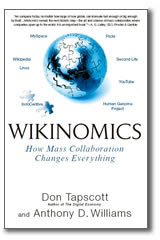Wikinomics
 Just recently HBR IdeaCast had a cool interview with Don Tapscott. He's one of the authors of Wikinomics. How mass collaboration changes everything. I just ordered the book.
Just recently HBR IdeaCast had a cool interview with Don Tapscott. He's one of the authors of Wikinomics. How mass collaboration changes everything. I just ordered the book.Tapscott has some interesting remarks. I'll give you a few snippets:
"You have four big factors coming together at this unique time in economics and in human history: 1. the new web, ... the old web was a publishing platform ... The new web is based on XML and it's creating a giant global computer that everyone programs whenever they use it. So this is creating a platform for self-organisation. 2. Second factor, there's a demographic revolution. The children of the baby boom are the first generation grown up bathed in bits. These kids are different, they process information differently, they think and behave differently. And they are now the biggest generation in the workforce and in the marketplace, they're coming into the workforce and the marketplace. Put those two together and you get a social revolution. ... Then these three factors come together to create an economic revolution. Where the web is radically dropping collaboration costs. And you got a new generation that wants to innovate and behave differently. And this is resulting in this deep change in the way we innovate and orchestrate capabilities. So buckle up!"
Wikinomics is "becoming a new mode of production. If you can create an encyclopedia, with thousands of people you've never met. It's 10 times as big a Britannica, in dozens of languages, it's real-time, but the quality is just as good. Than what else can you create? It turns out you can create software. The Linux operating system. Or application software. There's a 150.000 open source application projects under way today. You can create a mutual fund. ... Could you create a savings bank? The embryo is called: Zopa. It turns out you can create physical things, goods and services. Even the most complicated thing I could think of, the most complicated product: a new-generation jumbo jet, the Boeing 787 Dreamliner, was created using the principles of wikinomics. So that's what wikinomics is. It's the art and science of harnessing mass collaboration for innovation, for growth, for competitive advantage and for profit."
Tapscott says: Rather than thinking in terms of hierarchies, think in terms of peers and peering. Rather that hoarding and fiercely protecting intellectual property, open it up. Rather that thinking: the best talent is inside the boundaries of our company, which is conventional wisdom, say "the world will be my
Go ahead and listen to the whole podcast!
But can't we solve this problem by thinking differently? For instance by adopting the things Tapscott is seeing? This would imply not hiring employees, but opening up our organisations to the world (of course not all of it, even Tapscott says so). But smartly opening up the company and in this way tap into all the smart people that are out there, but don't work for you. If they're not coming over to your company, why not come over to them?
Samuel



Comments
Post a Comment
Please leave a comment! Just log in using one of the formats and if you want me to get back to you. Otherwise comment anonymously.